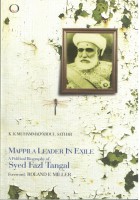
Book is a Relationship
Mappila Leader in Exile—a political biography of Syed Fazl Thangal
www.thehindu.com/todays-paper/tp-national/tp-kerala/a-clan-from-yemen-and-history-of-malabar/article4145304.ece
A clan from Yemen and history of Malabar
 |
There was one family in Malabar whose socio-religious standing the British authorities feared the most for its potential to inspire and mobilise the natives, especially Muslims, against the colonial rulers. It was the descendants of this family, including the most influential member of it, Syed Fazl Thangal, that the authorities furtively extradited to Arabia in March 1852 and ensured that they never returned to the coast of Malabar. Who was this Syed Fazl Thangal? How and why he and his family including his famous father, Syed Alawi Thangal, a member of the Ba Alawi clan from Hadhramaut in Yemen, who arrived in Malabar in February 1768 and settled at Mamburam in Malappuram district, to be later known as the Mamburam Thangal, was an important figure in the history of Malabar and its anti-colonial engagements? The book A book ‘Mappila Leader in Exile—a political biography of Syed Fazl Thangal’ authored by K.K. Muhammad Abdul Sathar, history professor and head of the History Department, PSMO College Tirurangadi in Malappuram, attempts to give an answer to theses questions while also throwing some light on the socio-political environment of the region during the colonial times. Dr. Sathar, who is son of the late Mappila historian and writer Muhammed Abdul Kareem, has his Ph.D. on the Ba Alawi clan and its settlement on the Malabar Coast at a historically crucial period. With the support of historical documents and citations the author recounts how some members of the Arabian clan reached Malabar and influenced the socio-political currents of the region. The book in English, published by ‘Other Books’ explains how Syed Fazl Thangal, after his brief sojourn in Mamburam as a spiritual, cultural and political leader of the region, was deported to Arabia. It narrates the roles he played in the international politics as a plenipotentiary with the Ottoman Khilafat besides giving insights to what relevance it had to both the international and the national politics of India. Among other things the work also throws light on the possible reasons of the murder of the then Malabar Collector H.V. Connolly by a group of Muslim radicals on September 11, 1855. According to him, Lt. Connolly was widely believed by the Muslims in Malabar to have acted behind the extradition of Syed Fazl Thangal to Arabia. Another important episode in the book narrated by the author is the account of how and why Muhammad Abdul Rahman Sahib, one of the most vibrant national leaders from the State, tried his best to bring some descendents of Thangal back to Kerala in the following years to give strength to the freedom fighters, and how the British successfully tried to foil this plan using all its might. Foreword Noted historian Roland E. Miller in his foreword to the book says: “As to Syed Fazl’s religious frame of reference the author makes a notable contribution by tracing the South Arabian mystical legacy of his family that helped produce the saintly Thangal tradition in Malabar.
|
